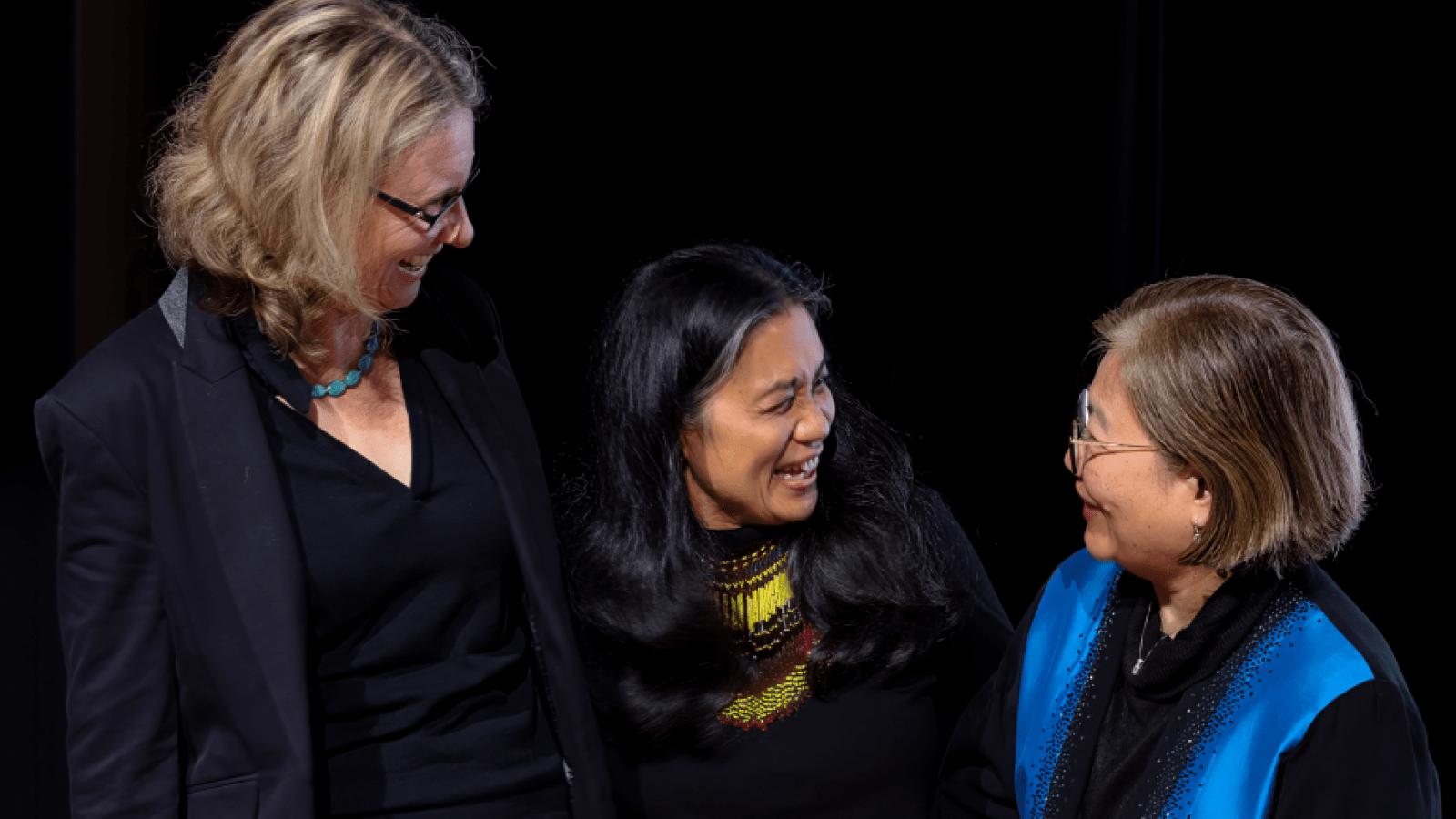A call for kindness in these dark times

Dr Lucy Neave, Dr Merlinda Bobis, and Her Excellency Maria Hellen B. De La Vega at the book launch for The Kindness of Birds. Image credit: the Philippine Embassy
It was the best of times, it was the worst of times, with the pandemic bringing out our most self-interested impulses, but also our humanity and selflessness.
ANU Honorary Senior Lecturer Dr Merlinda Bobis’ new book was completed at the height of the pandemic and borne of tragedy – but also of hope. The Kindness of Birds is a homage to kindness across cultures, species, and between people. It interrogates unkindness as well, and she asks us to examine both within ourselves.
“When COVID hit, we kept on invoking kindness,” Dr Bobis says. “Our favourite line now is, ‘We’re in this together’. But always my question throughout these times is, who are included, who are excluded? When you say ‘we’, who is ‘we’? Is ‘we’ someone who looks like us, speaks like us, who comes from our tribe?”
“The moment you go into that,” she adds, “the issue of kindness becomes a little tricky.”
The Kindness of Birds is Dr Bobis’ second collection of short stories. It was launched at the National Gallery of Australia by the Philippine Ambassador to Australia, Her Excellency Maria Hellen B. De La Vega, as part of the 75th anniversary of the establishment of diplomatic relations between the Philippines and Australia. The book is also her most personal, having its origins in 2018 as her father was dying in the Philippines. Her mother had told her about the two orioles that would visit and sing for him.
“They used to come and sing in the garden and he loved them,” Dr Bobis says. “He would wait on the porch for them, even if he was already unwell. I think it’s wonderful, that gift of comfort.”
In Braddon where she now lives, she contemplated that memory and the line ‘the kindness of birds’ came to her. As it did, two rosellas flew skyward. And Dr Bobis thought: this book wants to be written.
She got to work, embarking on research trips that took her to Broome and Tasmania. The Broome trips surfaced as stories about legendary pearl divers: Filipino Candido Iban (1890s) and Filipino-Javanese-Aboriginal Fred Corpus, a Yawuru elder. She met “Uncle Freddy”, as she affectionately calls him, by chance at the Roebuck Bay Hotel bar and quickly fostered a relationship.
“A lot about him reminded me of my father,” Dr Bobis says, including how Uncle Freddy was 91 and her father was also that age when he died early that year. “When we left Uncle Freddy, I was near tears, as you’ll read in the ending of that story. When I think of him, I tear up.”
Her stories, about the family you have and the family you create, are threaded through with illness and death, love and connection. Her longest story, Ode to Joy, is set in Wollongong, her home before Canberra. One story concerns domestic abuse, and has as its backdrop the Parliament House. In Angels, Nenita is lovingly treated for breast cancer, just as Dr Bobis was late last year (“A shout out to our wonderful nurses!” she says). Another story features a PhD student from ANU, whose thesis supervisor is Dr Lucy – a nod to her colleague in the School of Literature, Languages and Linguistics, Dr Lucy Neave, who spoke at Dr Bobis’ book launch.
“There’s a lot of me there and a lot of my world between Australia and the Philippines,” Dr Bobis says, “but it goes beyond that. As Balzac said: fiction is symbolic autobiography.”
The lines of The Kindness of Birds often read like poetry, befitting its award-winning author who has penned six books of poetry and performed her work as music and in theatrical settings. Just as the words flow off the page, so too do the phrases in other languages: seamlessly, rather than calling attention to themselves.
More languages are featured in the book than Dr Bobis can identify when we speak, but the ones we can count for certain are Bikol (Dr Bobis’ mother tongue), Filipino, English (“because of American colonization”), Spanish (“because we were also colonized by Spain”), and German.
The predominant theme across all the stories, though, are birds. A crow maimed by hail and given its last rites in the chamber of the House of Representatives. Glass doves on a perfume bottle cap. A king parrot darting past the poplars in Haig Park. Wild birds appear sometimes fleetingly but always meaningfully, in the book as in Dr Bobis’ life.
Even as I’m recording Dr Bobis reading from her book, two rosellas perch on her office windowsill, peering in, making her eyes widen with joy.
“A lot of uncanny things happened while I was writing this book, in relation to birds,” Dr Bobis says. “That’s why it’s all about birds.”
In the span of two years, Dr Bobis lost four members of her family, including her parents. Images of COVID patients in ICU haunted her, reminding her of the suffering of her father then her mother, who passed a year after him. What managed to cut through this darkness was playing the ukulele that her partner bought for her as a “solace gift” – and birds that would sing back to her.
“I could go on and on, but I feel… so loved,” she says. “And I want to record this in this book. To say, even in the bleakest of times, there is kindness. There is joy.”
“It’s the natural world coming to us and if we are open to it, it’s open to us too. This is our source of salvation – if we are not kind to the planet, it will get back to us. It cannot survive without the kindness of everyone around it.”
The Kindness of Birds is published by Spinifex Press.
Written by Evana Ho